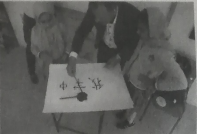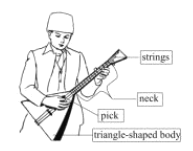题目内容

A Chinese song could be heard in a classroom in Sanaa, the capital of Yemen(也门), where around 20 Chinese-learning schoolchildren were singing. "I love to learn the Chinese language because it is very nice, important and I want to travel to China to complete my studies there," Karim al-Areqi, a student of the private Languages Model School in Sanaa, told Xinhua.
Teacher Mohammed Al-Ansi, who learnt the language in China and received a university degree, stressed(强调) the importance of learning the Chinese language. "It is the language of the future and it is necessary for all people to get advantages from the great development in China," he said.
Like many other private elementary and secondary schools in Yemen, the Chinese language is a basic part of the Languages Model School's courses, where the students study Chinese as actively as math and science subjects. "In teaching the Chinese language, I succeeded in educating students in a simple way that fits everyone," Al-Ansi said proudly, stressing that teaching Chinese has changed his life without doubt.
Al-Ansi expects that Yemen and China will work together to set up centers and schools for teaching the Chinese language in Yemen so that many young Yemenis can learn. "I hope that a branch of the Confucius (孔子学院), could be built in Yemen to teach the language and spread the Chinese culture to many students and researchers who are interested in learning the Chinese culture and language," he said. Many people in Yemen see that learning a foreign language may open a way of hope to a new life, such as getting more money and paving(铺平)the way to a bright future in the country that has experienced war for almost five years.
1.The passage tells us that Mohammed Al-Ansi .
A.has got a university degree in Yemen B.sings Chinese songs well
C.thinks it important to study Chinese D.owns a language school
2.In the Languages Model School, the students .
A.consider Chinese a simple language B.do well in science and math
C.take pride in Mohammed Al-Ansi D.are active in learning Chinese
3.The 4th paragraph is mainly about .
A.the Chinese culture B.Mohammed Al-Ansi's hope
C.centers for learning Chinese D.the way of doing research
4.It can be learnt from the passage that .
A.many young Yemenis learn Chinese for a better future
B.learning Chinese is sure to make Yemenis rich
C.more and more Yemenis are going to work in China
D.Chinese has been popular in Yemen for five years


